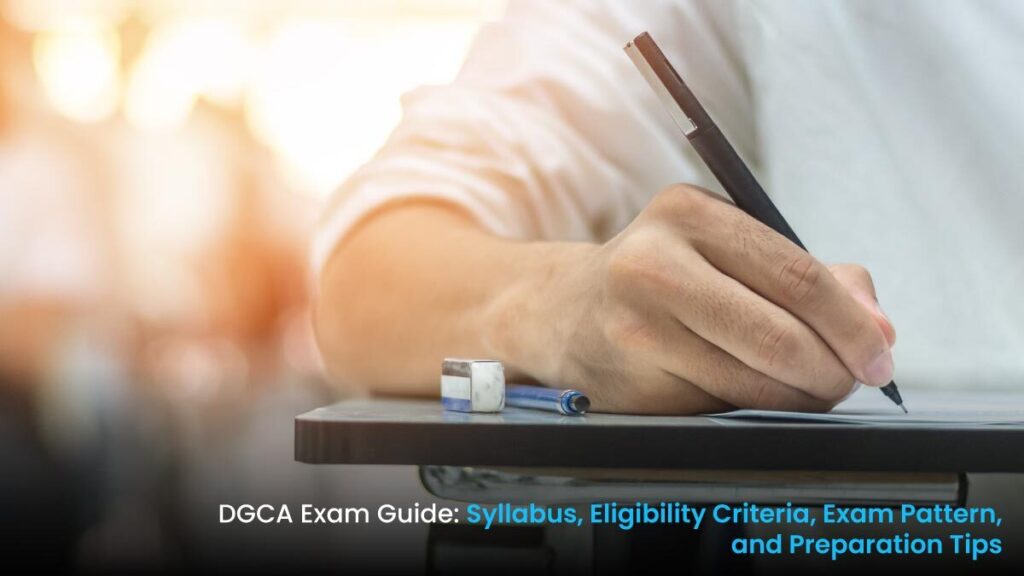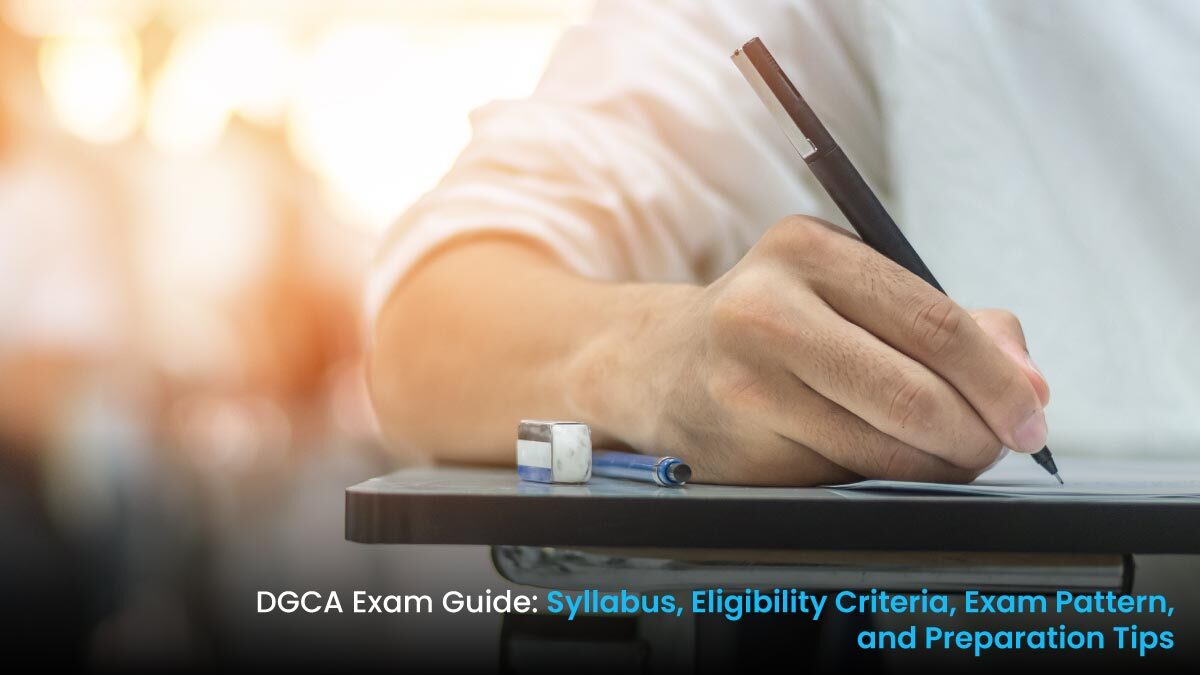
The dream to become an airline pilot who leads an aircraft into the skies remains an intense aspiration for people who plan to join the aviation world. Every future pilot must prepare themselves thoroughly before successfully passing the DGCA exam to achieve their flight objectives. The Directorate General of Civil Aviation (DGCA) runs a necessary examination to give licensed pilot credentials in India.
This complete guide teaches how to understand the DGCA examination content, qualification requirements, test structure, and useful preparation approaches to help you through this essential aviation career checkpoint.
Understanding the DGCA Exam
The definition of the DGCA exam needs clarification since we must understand its basic characteristics. India’s civil aviation gets its oversight under the DGCA authority, which maintains oversight of flight safety as well as licensing and aviation regulatory processes. A candidate’s aviation-related subject knowledge and understanding will be assessed through the series of examination tests configured by DGCA. The examination serves as a legal prerequisite to receive two essential flying endorsements namely Commercial Pilot Licence (CPL) and Airline Transport Pilot Licence (ATPL).
Eligibility Criteria for DGCA Exam
Many people who want to become pilots have doubts about the eligibility criteria for their DGCA certification exam. Licencing requirements change based on the pilot certification one selects, but most candidates must meet fundamental standards that include:
- Age: The minimum qualification age depends on the specific flight license type they wish to obtain. Student Pilot License holders need to reach 16 years or older for eligibility, but CPL applicants should meet a minimum age requirement of 18 years.
- Educational Qualification: Candidates must obtain a 10+2 education certificate which includes Physics with Mathematics as essential science subjects. Students who missed Physics and Mathematics education in school have two options to validate these requirements through NIOS or equivalent programmes.
- Medical Fitness: To pursue pilot training, aspirants need to fulfil medical fitness standards tested by DGCA-sanctioned medical examiners. All candidates must fulfil guidelines that verify their physical and psychological health abilities for aviation operations.
- Flying Experience: The DGCA requires candidates who apply for CPL along with ATPL to meet flying experience requirements that match recommendations.
Evaluating eligibility requirements should start with the official DGCA website because it contains the latest updated standards.
DGCA Exam Syllabus and Subjects
Students need to understand the complete structure of the DGCA exam syllabus to gain effective preparation results. The teaching content evaluates candidates through theoretical knowledge exams, which cover various subjects related to aviation. The key subjects include:
- Air Regulations: Covers Indian and international aviation laws, rules, and procedures governing air travel.
- Aircraft General Knowledge: Includes the principles of aircraft systems, engines, instruments and structures.
- Navigation: Focuses on flight planning, air navigation techniques, and the use of modern navigation systems.
- Meteorology: Teaches weather phenomena, their impact on flying, and methods to interpret meteorological data.
- Aviation Meteorology: A specialised branch of meteorology that deals with aviation-specific weather conditions and forecasting.
- Radio Telephony: Covers communication protocols used by pilots to interact with Air Traffic Control (ATC) and other aircraft.
- Human Performance and Limitations: Discusses how physiological and psychological factors affect pilot performance, including fatigue management and stress handling.
The DGCA exam consists of written tests, primarily multiple-choice questions (MCQs). Some advanced licenses may also require oral interviews and flight checks.
Effective Preparation Strategies for DGCA Exam
The DGCA pilot exam is challenging, but with the right approach, candidates can maximise their chances of success. Here are some practical preparation tips:
- Develop a Study Plan: Students need an organised study schedule for their success. Divide your subject material into smaller sections then schedule particular time blocks for each topic. Regular practice during study sessions results in an improved understanding of subjects.
- Use Reliable Study Materials: Students should allocate their funds toward acquiring textbooks endorsed by DGCA along with study guides approved by DGCA and choosing online educational materials. Popular educational resources dedicate complete coverage to the curriculum standard as well as question examples and clarification content.
- Practice with Mock Tests: Using prior question papers and mock tests for the exam will enable you to understand how the examination format works. The act of practising exams under real examination conditions helps students develop better time management abilities.
- Consider Coaching (Optional): The pursuit of aeronautical knowledge through self-study remains feasible but the training offered by flight institutions and coaching programmes brings organised subject matters and experienced mentorship with standardised evaluation processes.
- Focus on Conceptual Understanding: Prioritise the grasp of basic concepts instead of the traditional approach of memorisation. Sufficient familiarity with underlying concepts enables better performance in application-based questions.
- Stay Updated with Aviation Trends: The aviation industry expands with increasing speed. An expansion of your aviation competency derives from reading aviation news together with studying the regulatory DGCA circulars and relevant publications which introduce you to both industry trends and technological developments and regulatory updates.
- Maintain a Healthy Lifestyle: The necessary condition for achieving your performance goal requires a psychically and physically healthy state. Your stress management will benefit greatly from proper sleep combined with diet balance and physical exercise.
- Seek Guidance When Needed: Professional pilots and instructors together with your fellow students must receive your immediate contact when academic obstacles emerge. The participation in online student forums and study groups enables students to find extra support and additional knowledge.
- Maintain a Positive Mental Attitude: The development of self-confidence comes from a positive mental attitude. Candidates need perseverance along with a strong belief to pass the DGCA pilot examination. Your ability to advance depends on maintaining faith in your skills together with a positive outlook while facing any challenge.
Conclusion
The completion of DGCA exams stands as a critical requirement for attaining professional pilot status. To succeed in the DGCA examination students need comprehensive preparation along with a strong knowledge base in aviation theory together with self-disciplined study methods. Aspiring pilots who complete their curriculum studies together with the required qualifications and create efficient study strategies will boost their examination success potential.
Aviation functions as a field which requires both determination and lifelong education. Your dedication and consistent effort will lead you toward your aviation goal of earning flight qualifications and reaching your dream of high-altitude aviation. Safe skies ahead!

